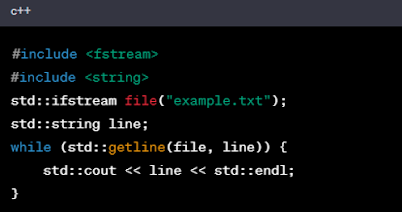INTRODUCTION
C++ is frequently used for things like:
System programming: Programming for systems: Operating systems, device drivers, and other system-level software are frequently created in C++.
Game development: The creation of high-performance, low-level game engines, and other gaming systems is done by many game developers using the C++ programming language.
Application development: C++ is frequently used for creating desktop programs, such as software for editing photos and videos.
Web development: C++ can be used for server-side web development, particularly for building high-performance web applications that require low-level access to hardware resources.
Financial applications: The financial sector uses C++ to create software for risk management, trading, and other financial applications.
What is C++?
Overall, C++ is a sophisticated programming language that is ideal for creating complicated, high-performance software. However, it might be difficult to learn, especially for beginners who are new to programming.
Can we use C++ in HTML?
HTML (Hypertext Markup Language) is a markup language that is used to construct web pages and describe their structure and content. It is a markup language that defines various aspects of a webpage using tags and attributes, including text, images, links, and forms.
C++, on the other hand, is a general-purpose programming language that is used to create a wide variety of software applications, such as system-level software, games, desktop programs, and embedded devices.
To summarize, C++ and HTML are two distinct technologies that fulfill distinct functions and cannot be utilized interchangeably. C++, on the other hand, can be used in tandem with web development to create server-side applications and other software that interacts with online sites.
What are the benefits of C++?
High performance: C++ is a compiled language that produces efficient, optimized code that runs very rapidly. As a result, it's perfect for high-performance applications like games and operating systems.
Portability: C++ code is portable because it can be compiled and run on a variety of platforms, including Windows, Linux, macOS, and many embedded systems.
Object-oriented programming: C++ supports object-oriented programming (OOP), which allows developers to create reusable code and build complex, modular software systems.
Low-level access to hardware: C++ provides direct access to hardware resources, such as memory and CPU registers, which allows for low-level optimization and fine-tuning of software.
Large community and resources: C++ has a large and active community of developers, which means there are many resources available for learning, sharing, and collaborating on projects.
Compatibility with C: C++ is backward-compatible with C, which means that existing C code can be easily integrated into C++ projects. This makes it easier to leverage existing code and libraries.
Overall, C++ is a powerful language that offers many benefits for developing complex software applications that require high performance and low-level access to hardware resources.
What are C++ types?
The term "compiled" refers to the process by which code is transformed into machine code by a compiler before it can be executed. C++ programs may therefore execute very rapidly and efficiently, making it a popular choice for performance-critical applications.
"Static-typed" means that each variable and expression in C++ is assigned a type at compile time and that this type remains constant throughout the program's lifetime. This provides for faster memory allocation and access by catching certain types of faults at compile time rather than runtime.
C++ also enables procedural and object-oriented programming paradigms, allowing developers to create code that is organized, modular, and reusable. It has capabilities like templates, which allow for generic programming, and exception handling, which makes handling errors and exceptions in code easier.
Overall, C++ is a robust and adaptable programming language used to create complex, high-performance software programs.
Topics we learn in C++?
1)Basic syntax and data type: in C++, you can declare and initialize variables like this:
2)Control structures: C++ provides various control structures, such as if-else statements, loops, and switch statements. Here is an example of an if-else statement:
3)Functions: Functions in C++ allow you to break your code into smaller, reusable pieces that can be called from other parts of your program. Here is an example of a function that takes two integers and returns their sum:
4)Pointers and references: C++ provides pointers, which allow you to directly manipulate memory locations in your program, and references, which allow you to create aliases for variables. Here is an example of using a pointer to access the value of a variable:
5)Object-oriented programming: C++ is an object-oriented programming (OOP) language, which means that it provides features such as classes, objects, encapsulation, inheritance, and polymorphism. Here's an example of a class definition:
6)Templates: Templates allow you to write generic code that can be used with multiple data types, which can save you time and effort in writing code. Here is an example of a template function that returns the minimum of two values:
7)Standard Library: C++ provides a rich Standard Library that includes various data structures, algorithms, and other utilities that can be used in your programs. Here is an example of using the std::vector class to store a collection of integers:
8)File input/output: You can read and write files in C++ using the <fstream> library. Here's an example of a line-by-line file read:
9)Exception handling: C++ provides a mechanism for handling errors and exceptions in your code using the try-and-catch keywords. Here is an example of catching an exception:
So that’s it for today guys if you want to learn more, so follow us...
We will soon upload the second of C++ roadmap part 2
Keep learning....😊😊









No comments:
Post a Comment